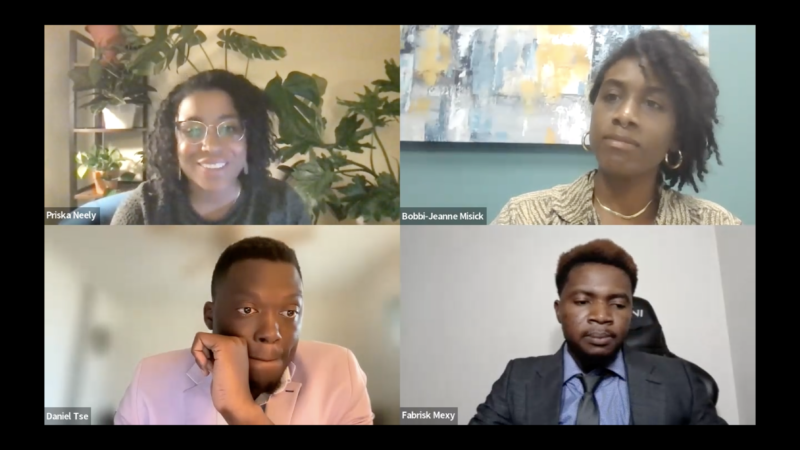WATCH: A conversation on the experiences of Cameroonians in immigration detention with the Gulf States Newsroom
Gulf States Newsroom managing editor Priska Neely moderates a discussion between GSN race, justice and equity reporter Bobbi-Jeanne Misick and guests Daniel Tse and Fabrisk Bidpua on Zoom. The discussion was part of a virtual listening session the GSN hosted on Misick's three-part series on experiences of Cameroonian asylum seekers in the Louisiana and Mississippi immigration system.
Last year, Gulf States Newsroom reporter Bobbi-Jeanne Misick partnered with Type Investigations to publish an investigation on the experiences of Cameroonian asylum seekers in the Louisiana and Mississippi immigration system.
Her reporting uncovered numerous challenges faced by asylum seekers from Cameroon, including abuse, lengthy detention stays and threats of deportation. Immigration judges in Louisiana were also found to be much less likely to side with asylum seekers compared to other parts of the country. As a result, these individuals often find themselves caught in the thorny and unjust immigration system of the Gulf South.
On April 18, Misick and Gulf States Newsroom managing editor Priska Neely hosted a virtual listening session for Misick’s three-part series. The date marked one year since the Biden Administration granted Cameroonians Temporary Protective Status (TPS), which would allow them to stay and work in the U.S. without fear of deportation for 18 months.
Afterward, Misick and Neely discussed what’s changed since the TPS order and the dilemmas asylum seekers still face. Guests included Fabrisk Bidpua, who came to the U.S. to seek asylum as a college student, and Daniel Tse, founder of the Cameroon Advocacy Network and legal fellow at RFK Human Rights.
You can watch a replay of the listening session below.
Read more from Bobbi-Jeanne Misick:
- New complaint alleges sex assault, medical neglect, abuse of detainee at Louisiana ICE facility
- Spurred by slow deportation wait times, Louisiana ICE detainees attempted a hunger strike
- A small team works to aid immigrants in Louisiana: ‘Do the best you can with the time you have’
- Seeking asylum in the U.S. is not easy. It’s harder when you speak a rare language
40 years after ‘Purple Rain,’ Prince’s band remembers how the movie came together
Before social media, the film Purple Rain gave audiences a peak into Prince’s musical life. Band members say the true genesis of the title song was much less combative than the version presented in the film.
Park Fire in California could continue growing exponentially, Cal Fire officer says
Cal Fire has confirmed that over a hundred structures have been damaged in the Park Fire, which grew overnight near Chico, Calif. Difficult firefighting conditions are forecast through Friday night.
Checking in with Black voters in Georgia about the election, now that Biden is out
Some voters who could be key to deciding who wins Georgia. What do they think about Vice President Harris becoming the frontrunner in the race to be the Democratic nominee?
Tahiti’s waves are a matter of ‘life and death’ for surfing Olympics
Tahiti's Teahupo'o wave has a slew of riders for the Paris 2024 Olympics. NPR finds out why it's called one of the most dangerous waves.
Researchers are revising botanical names to address troubling connotations
Since the mid-1700s, researchers have classified life with scientific names. But some of them have problematic histories and connotations. The botanical community is trying to tackle this issue.
A spectacular opening ceremony wowed a global audience despite Paris’ on-and-off rain
The Paris Olympics opening ceremony wowed Parisians, fans and most everyone who was able to catch a glimpse of thousands of athletes floating down the Seine to officially begin the Games.



